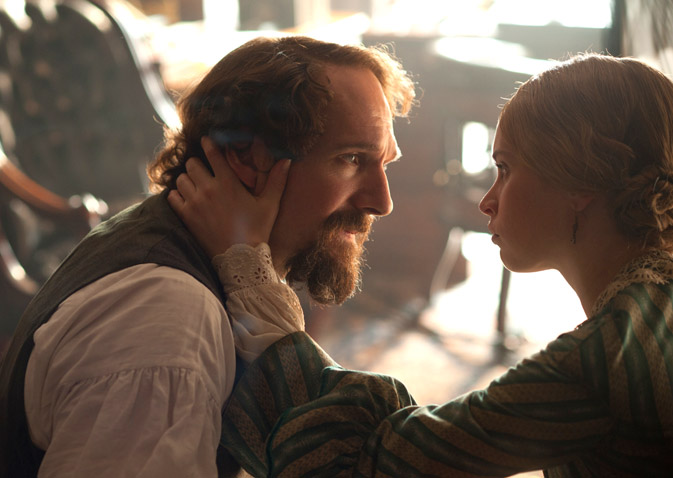 Charles Dickens and his comely, considerably younger mistress have a dickens of a time getting their adulterous act together in “The Invisible Woman,” a directing, as well as starring, turn for Ralph Fiennes. He’s rarely been better than he is as the 19th century’s most celebrated novelist, with his chops on camera just about matched by what he’s done behind. The problem is that we’ve seen so many fictions about Victorians who can’t let the onset of real passion break up their stuffy marriages that even a true-life variation doesn’t have that much to add to the genre, much less that’s thematically worthy of Dickens.
Charles Dickens and his comely, considerably younger mistress have a dickens of a time getting their adulterous act together in “The Invisible Woman,” a directing, as well as starring, turn for Ralph Fiennes. He’s rarely been better than he is as the 19th century’s most celebrated novelist, with his chops on camera just about matched by what he’s done behind. The problem is that we’ve seen so many fictions about Victorians who can’t let the onset of real passion break up their stuffy marriages that even a true-life variation doesn’t have that much to add to the genre, much less that’s thematically worthy of Dickens.

Fiennes embraces his hairline even as he’s grown out a mop of side-parted curls right behind it, a loose look that helps reinforce the film’s notion that Dickens might have been probably the most fun mega-celebrity of the 1800s, and someone who surely would’ve surpassed Vidal and Mailer as the most naturally TV-suited of novelists if only he hadn’t been born too soon. His gregarious, hail-fellow-well-met demeanor is a poor fit for his portly, uninterested wife, who remarks to the mistress—not very approvingly—that the 50-ish Dickens is “nothing if not youthful.”
It’s a familiar story, now as then: celebrated artist has a spouse who doesn’t really give a hoot about the art, meets 18-year-old acolyte who can recite passages from memory and feels the soul behind them, too. The fan with whom he forms a mutual fascination society is Ellen Ternan, played by Felicity Jones, a full-lipped beauty who looks a little like a younger Scarlett Johansson when her mouth is at rest and Rosanna Arquette when it curls up into a smile. Hello, divorce court!

Or not, since either Victorian propriety or the promise of continued blockbuster book sales demands that Dickens not officially end his marriage, even though he writes a letter to the editor announcing a separation (without bothering to alert his wife or kids till they see it in the newspaper). So Dickens’ intellectual and sensual infatuation with Miss Ternan will end neither in a passionate second marriage nor a tearfully tragic parting, but … an old-fashioned “arrangement.” Which is the kind of thing that doesn’t make for a great third act.
And once the film establishes that these two kept their affair going on that same middle ground for years (13, to be exact, though you’d have to look that up), it’s hard to find that much tragedy in their plight or sense of loss for a great love thwarted. As much as Fiennes initially touches us with the loneliness behind the bonhomie, by the end it’s not clear whether he’s doing the best he can with illicit true love in a button-up period or just getting his rocks off in his declining years.

It’d be easier to invest if Jones seemed slightly worthier of the great man’s passions. Kristin Scott Thomas, as Ellen’s actress mother, is eager to pair her daughter off with Dickens, as a lover and benefactor if husband isn’t possible, because she recognizes Ellen is a great beauty who doesn’t have what it takes for success in the theater. Jones doesn’t lack the acting gene the way her character does, but at least in “The Invisible Woman,” the great soulfulness that attracted Dickens to Ellen is more evident in scripter Abi Morgan’s text than on Jones’ undeniably beguiling face.
Fiennes deserves kudos for his handling of the role of the dismissed wife, Katey, who at first looks like a typical movie shrew, or straw woman for the discarding. No one will exactly be rooting for Mr. and Mrs. Dickens to stay together, but as Katey, Joanna Scanlan is allowed a few terrific moments of real anxiety and torment. In her 10 minutes or so of screen time, she’s a more interesting “invisible woman” than the titular one. [B-]
This is a reprint of our review from the 2013 Telluride Film Festival.

